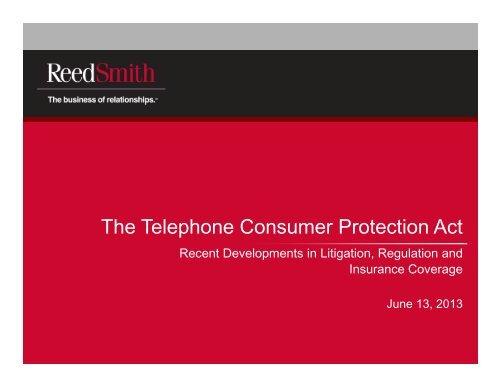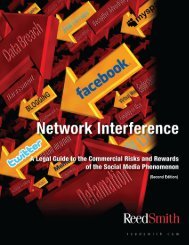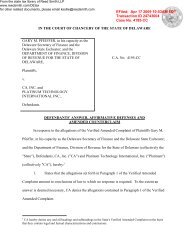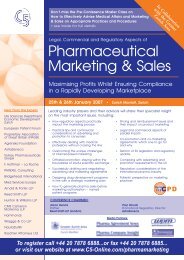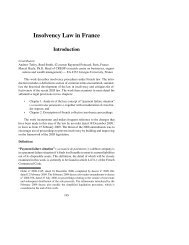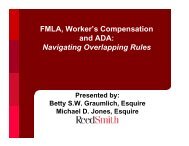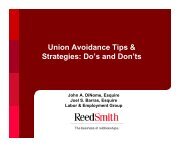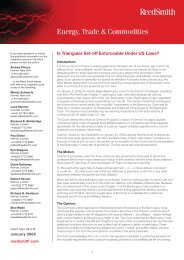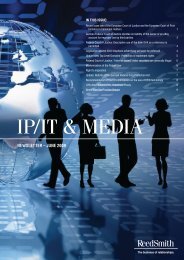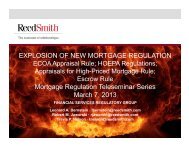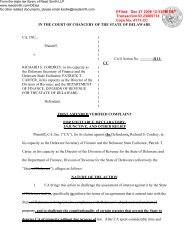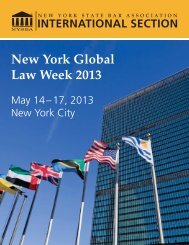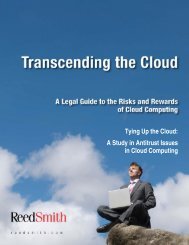The Telephone Consumer Protection Act - Reed Smith
The Telephone Consumer Protection Act - Reed Smith
The Telephone Consumer Protection Act - Reed Smith
You also want an ePaper? Increase the reach of your titles
YUMPU automatically turns print PDFs into web optimized ePapers that Google loves.
<strong>The</strong> <strong>Telephone</strong> <strong>Consumer</strong> <strong>Protection</strong> <strong>Act</strong><br />
Recent Developments in Litigation, Regulation and<br />
Insurance Coverage<br />
June 13, 2013
Presenters<br />
Henry Pietrkowski<br />
Partner<br />
Chicago<br />
+1 312 207 3904<br />
hpietrkowski@reedsmith.com<br />
Judith L. Harris<br />
Partner<br />
Washington, D.C.<br />
+1 202 414 9276<br />
jlharris@reedsmith.com<br />
Timothy P. Law<br />
Partner<br />
Philadelphia<br />
+1 215 241 1262<br />
tlaw@reedsmith.com<br />
“<strong>The</strong> <strong>Telephone</strong> <strong>Consumer</strong> <strong>Protection</strong> <strong>Act</strong> Teleseminar” by <strong>Reed</strong> <strong>Smith</strong> is to keep others informed of developments in the law. It<br />
is not intended to provide legal advice to be used in a specific fact situation; the contents are for informational purposes only.<br />
“<strong>Reed</strong> <strong>Smith</strong>” refers to <strong>Reed</strong> <strong>Smith</strong> LLP and related entities. © <strong>Reed</strong> <strong>Smith</strong> LLP 2013.
<strong>Telephone</strong> <strong>Consumer</strong> <strong>Protection</strong> <strong>Act</strong> (“TCPA”)<br />
47 U.S.C. § 227<br />
• Federal statute enacted by Congress over 20 years ago<br />
• To protect consumers from unwanted telephone calls and faxes<br />
• Implemented and interpreted by the Federal Communications<br />
Commission (FCC)<br />
• Enforced by the FCC, state Attorneys General, and private<br />
litigants<br />
• Cottage industry of class action lawsuits
Major Prohibitions<br />
• Autodialed and prerecorded calls/text messages to cell phones<br />
• Autodialed and prerecorded calls to leave messages at<br />
residential phone numbers<br />
• Unsolicited fax advertisements<br />
• Calls made to residential numbers on the “do not call” list
Cannot make autodialer or prerecorded calls to cell<br />
phones – 227(b)(1)(A)<br />
• Make any “call”<br />
• Includes text messages<br />
• Does not matter what the content is<br />
• Using an “automatic telephone dialing system” or “an artificial<br />
or prerecorded voice”<br />
• Without the “prior express consent of the called party”<br />
• To call a “cellular telephone service”
Cannot send unsolicited fax advertisements –<br />
227(b)(1)(C)<br />
• Use a telephone facsimile machine, computer or other device<br />
• To send an unsolicited advertisement to a telephone facsimile<br />
machine<br />
• “Unsolicited advertisement” means “any material advertising the<br />
commercial availability or quality of any property, goods, or services<br />
which is transmitted to any person without that person’s prior express<br />
invitation or permission, in writing or otherwise.”<br />
• Depends on the content of the fax<br />
• Exception for “established business relationships” under certain<br />
strict conditions<br />
• Requires specific opt-out language
Cannot call residential numbers on the national “do not<br />
call” list – 227(c)(5)<br />
• Only applies to residential subscribers, not business<br />
subscribers<br />
• Only applies if there is more than one such call within a 12-<br />
month period<br />
• Also must honor company-specific “do not call” requests
Private cause of action – 227(c)(3) & (c)(5)<br />
• $500 per violation (i.e., per call, text message or fax)<br />
• Strict liability statute<br />
• Lack of knowledge or intent is not a defense<br />
• For do-not-call violations only, defendant can avoid liability if it “has<br />
established and implemented, with due care, reasonable practices and<br />
procedures to effectively prevent telephone solicitations in violation of the<br />
regulations”<br />
• Can be increased up to $1,500 for a “willful” or “knowing”<br />
violation in court’s discretion<br />
• Intent to violate the statute generally is not required
Defenses<br />
• Prior express consent<br />
• No vicarious liability<br />
• Not an “automatic telephone dialing system”<br />
• Constitutional defenses
Consent Defense<br />
• Autodialed calls – “other than a call . . . made with the prior<br />
express consent of the called party”<br />
• Prerecorded calls to residences – “without the prior express<br />
consent of the called party”<br />
• Unsolicited fax advertisements – “without that person’s prior<br />
express invitation or permission”<br />
• Lesson: Get the person’s consent!
Consent Defense – Text Messages<br />
• Recent cases: voluntarily providing a cell phone number is<br />
itself consent to receive texts<br />
• Potential limits to this concept<br />
• Must the text relate to the reason for which the cell phone number was<br />
provided?<br />
• Must the text come from the company that obtained the number, not an<br />
affiliate?
Consent Defense – Debt Collection Calls<br />
• FCC ruling: debtor’s voluntary provision of cell phone number<br />
on a credit application is prior express consent to receive debt<br />
collection calls<br />
• Potential limits to this concept<br />
• Phone number must be provided in connection with transaction at issue<br />
• One court recently criticized FCC’s ruling as going beyond plain<br />
language of the statute – providing a phone number is only implied<br />
consent, not “prior express consent”<br />
• But most federal district courts do not second guess the FCC’s orders –<br />
only the federal courts of appeal can determine the validity of an FCC<br />
order under the Hobbs <strong>Act</strong>
Consent Defense – Revocation of Consent<br />
• Courts split on whether, once a debtor consents, that consent<br />
can be revoked under the TCPA<br />
• Three basic views<br />
• Consent never can be revoked<br />
• Consent can be revoked in writing, but not orally (similar to FDCPA)<br />
• Consent can be revoked orally or in writing
Consent Defense – Class Certification<br />
• Even if the named plaintiff did not consent, still can defeat class<br />
certification by showing that some absent class members did<br />
consent<br />
• Individual factual issues of consent predominate over common issues<br />
• Individual factual issues of consent make a case unmanageable<br />
• Individual factual issues of consent render the named plaintiff’s claim<br />
atypical<br />
• Depends on the facts of each case
Vicarious Liability Defense<br />
• Federal common law of agency applies<br />
• Independent contractors: Company must direct or control the<br />
manner and means by which the calls were made or faxes<br />
were sent<br />
• Employees: Depends on scope of employment<br />
• Even prohibited acts may be within the scope of employment<br />
• May depend on whether the employer knew about the employee’s<br />
actions
“Automatic <strong>Telephone</strong> Dialing System” (ATDS) Defense<br />
• TCPA defines an “automatic telephone dialing system” as<br />
“equipment which has the capacity (A) to store or produce<br />
telephone numbers to be called, using a random or<br />
sequential number generator; and (B) to dial such numbers.”<br />
• FCC determined that predictive dialers that use stored lists of<br />
numbers fall within this definition<br />
• Must autodialer still have the “capacity” to generate random or sequential<br />
numbers?<br />
• Must the autodialer have the present capacity to generate<br />
random or sequential numbers?<br />
• If “future” capacity, can any computer or smartphone be an ATDS simply<br />
by downloading a software program?
Third-party Claims<br />
• List provider<br />
• Broadcaster<br />
• Third-party marketing company<br />
• Insurance company
Regulatory Enforcement<br />
<strong>The</strong> View From D.C.
TCPA Now Generating Greater Interest – and More Confusion<br />
– Than Ever (and Not Just in the Courts!)<br />
• Increased business need to reach large numbers of consumers<br />
for informational and other purposes, such as debt collection<br />
• Companies turning to evolving technologies<br />
• Regulators can’t keep up, leaving muddle of ambiguity<br />
• Complicating compliance efforts<br />
• Leading to exploitation by zealous plaintiffs’ bar
Other Factors Driving Attention<br />
• <strong>Consumer</strong>s are increasingly reachable only via wireless<br />
devices, more heavily regulated under the TCPA<br />
• Robocalls can now be placed from anywhere, virtually for free,<br />
using VoIP
What We’re Up Against<br />
• Along with FTC’s <strong>Telephone</strong> Sales Rule (“TSR”), TCPA is wildly<br />
popular with consumers<br />
• Congress knows it; the FCC knows it<br />
• And the numbers prove it<br />
• TCPA-related complaints constitute by far the majority of all consumer<br />
complaints to the FCC<br />
• FCC’s 5/9/13 Report of 4th Q 2012 Inquiries and Informal Complaints:<br />
• 36,230 out of 38,428 wireline complaints (94%)<br />
• 23,965 out of 30,090 wireless complaints (80%)
<strong>The</strong> Result<br />
• Increased enforcement by the FCC<br />
• Revised regulations, creating greater compliance burdens<br />
• Hesitation to clarify ambiguities at the risk of displeasing<br />
Congress and consumers
FCC Enforcement Process<br />
• Agency sends “citation of the violation charged” pursuant to 47<br />
USC 503(b)(5), generally in response to consumer complaints<br />
• Recipient has opportunity to rebut charges<br />
• After any adverse finding:<br />
• FCC publishes Citation and Order (fair game for class action lawyers!)<br />
• Future violations can result in monetary forfeitures, not only for new<br />
violations, but for earlier violations covered by citation
Increased Enforcement<br />
• Maximum forfeiture currently $16,000 per violation<br />
• FCC now imposing maximum forfeitures in egregious cases<br />
• 5/3/2013 - $978,500 forfeiture against Patrick Keane/the Street Map<br />
Company for willful, repeated violations of Section 227(b)(C) and Section<br />
64.1200 (a)(4) of FCC’s rules for delivering 100 unsolicited ads to 90<br />
consumer fax machines<br />
• 3/15/2013 - 2 Citations and Orders, to Democratic Dialing and to Dialing<br />
Services, LLC (also all owners, principals, officers) for making millions of<br />
auto-dialed calls to wireless phones (and for leaving prerecorded/artificial<br />
voice messages) w/o prior authorization and w/o providing required<br />
identifying information; FCC opined: any future enforcement action based<br />
on just first 300 of the cited violations would result in potential forfeiture<br />
of $4,800,000
Greater Compliance Burdens:<br />
2/15/2012 Report and Order<br />
• Where possible, synchronized TCPA and TSR rules<br />
• Eliminated “established business relationship” exemption to<br />
rule that telemarketing robocalls to residential wireline phones<br />
can occur only with prior express consent from consumers<br />
• Requires that all prerecorded telemarketing messages include<br />
an automated, interactive “opt-out” mechanism (eff. 1/14/13)
New Obligations – FCC’s 2/12/2012 Report and Order<br />
• Alters process for measuring call abandonment rates (effective<br />
11/15/2012)<br />
• TCPA limits telemarketers to a 3% call abandonment rate (“dead air<br />
calls”) when using predictive dialers<br />
• Order modifies FCC’s rule to require that assessment of call<br />
abandonment rate occur during single calling campaign, over 30 day<br />
period<br />
• If campaign exceeds 30 days, rate to be calculated for each subsequent 30<br />
day period (or portion thereof) during calling campaign<br />
• Single marketing campaign defined as offer of the same good or service for<br />
the same seller (even if different wording in scripts)
And the Big One!<br />
• Effective 10/16/13, telemarketers must obtain prior express<br />
written consent from consumers before calling their wireline or<br />
wireless phones with prerecorded telemarketing messages and<br />
before using an autodialer to call or text their wireless numbers<br />
with telemarketing messages
Still to Come!<br />
• TCPA bans autodialed calls to public safety phones w/o emergency purpose<br />
or prior express consent<br />
• Compliance difficult; problems increasing, sometimes dramatic<br />
• Congress – acted in 2012 Middle Class Tax Relief and Job Creation <strong>Act</strong>;<br />
FCC rules -10/2012<br />
• Agency will create, and those making robocalls will have to check, a Do-Not-<br />
Call Registry of Public Safety Answering Point (“PSAP”) phone numbers<br />
• Monetary penalties between $10,000 and $100,00 for each autodialed call<br />
to registered number; higher penalties for dissemination of registered<br />
numbers ($100,000 to $1 million per episode)<br />
• 5/13/2013 – Small Entity Compliance Guide summarizing new rules; stating<br />
some operational details remain to be resolved; public notice to be issued<br />
with rules’ effective date once registry is operational. STAY TUNED!
Today’s Hot Topics<br />
Plenty of Questions; Just No Answers<br />
• Perhaps as many as a dozen requests for declaratory rulings<br />
await resolution by the FCC<br />
• Virtually all have been filed by, or on behalf of, businesses seeking<br />
interpretations of ambiguous aspects of TCPA<br />
• Many have been at issue for at least several years<br />
• Most involve questions that have generated litigation, often class actions<br />
• Yet the FCC appears unwilling, due to TCPA’s popularity, high volume of<br />
complaints, to provide any advice that might be seen as “anti-consumer”
Unless the Commission is on really safe ground<br />
• SoundBite Communications,Inc.<br />
• 11/26/2012 - FCC agreed that single confirming text message sent<br />
immediately after a “do not text” request does not violate TCPA<br />
• Issue had generated numerous class actions against major companies<br />
and was starting to result in large settlements<br />
• Confirming texts had been adopted as “best practice” in guidelines of<br />
Mobile Marketing Association<br />
• Politically powerful entities weighed in<br />
• Most important – consumer group supported practice as in public interest
Or its back is up against the wall!<br />
• DISH Network et al<br />
• 3 related petitions filed in early 2011, resulting from judicial primary<br />
jurisdiction referrals, involving litigation stayed pending FCC rulings<br />
• All questioned whether TCPA’s prerecorded message and do-not-call<br />
provisions create seller liability for unlawful marketing calls made by<br />
others on seller’s behalf<br />
• 5/9/2013 -FCC found sellers may be vicariously liable under federal<br />
common law agency principles for violations of sections 227(b),(c) by<br />
telemarketers who initiate calls to market sellers’ products or services
Primarily, though, Important Questions Await Decisions<br />
that Never Come<br />
• Small sample of pending requests<br />
• Automatic <strong>Telephone</strong> Dialing System (“ATDS”) – Is it this? Is it THIS?<br />
• Communication Innovators – asks FCC to clarify that predictive dialers not<br />
used for telemarketing purposes and without the current ability to generate<br />
and dial random or sequential numbers are not ATDS’s<br />
• Prerecorded Messages<br />
• CallAssistant, LLC – asks FCC to clarify relevance of prerecorded message<br />
rules to company’s use of operator supervised prerecorded call segments that<br />
enable calling agents to interact with the called party by using the agent’s own<br />
voice or by pressing button to substitute appropriate audio recording response
Plenty of Questions; Just No Answers<br />
• Consent – What to Get, How Get it, Who to Get it from!<br />
• Paul D. S. Edward – asks FCC whether creditor may place autodialed or<br />
prerecorded message calls to telephone number associated with<br />
wireless service, if number when initially provided was landline<br />
• Cargo Airline Association – asks Agency whether package delivery<br />
companies can rely on sender representations that intended package<br />
recipients consented to receiving autodialed/prerecorded calls to wireless<br />
numbers for notification purposes regarding package shipments
So What’s A Person To Do?<br />
• Try always to obtain prior express written consent to reach out to a debtor,<br />
customer or potential customer at the time a debt is created, a relationship<br />
is established, an inquiry is made, at any of the phone numbers provided<br />
• Clearly state exactly what it is that the customer is consenting to; anything<br />
other than unambiguous language could impact your ability to rely on such<br />
consent as an affirmative defense in any subsequent litigation<br />
• Indicate up front that “by providing any telephone number for contact<br />
purposes, you are confirming that the telephone number you are providing<br />
belongs to you and not to a family member or other third party”<br />
• For debt collection purposes, use a disclosure such as, “by signing here and<br />
disclosing your mobile telephone number, you are agreeing that we or our<br />
agents or contractors can call you on that number using an automatic<br />
telephone dialer and/or that we or our agents or contractors can leave a<br />
prerecorded and/or text message on that number”
So What’s A Person To Do? (cont’d)<br />
• If you want to use contact information for marketing purposes, include disclosure that “by<br />
signing here you are also consenting to receive pre-recorded or automated voice marketing<br />
messages on your residential telephone unless that number appears on the national, or our<br />
company-specific, ‘Do Not Call’ list”<br />
• Once you get prior express written consent to clearly articulated disclosure(s), make sure you<br />
keep good, admissible records of how, when, and from whom you received the consent<br />
• Although it’s far from a guarantee of protection, consider leaving your debt collection to an<br />
independent contractor, and making certain to include specific language in a written agreement<br />
with that contractor that it, and it alone, is responsible for complying with all state and federal<br />
laws and regulations, including, but not limited to, the TCPA and the FTC’s Fair Debt Collection<br />
Practices <strong>Act</strong><br />
• Adopt internal rules designed to mitigate consumer frustration, such as procedures insuring<br />
that requests to cease calling are respected and that consumers are not unduly bombarded<br />
with high number of unwelcome interruptions in given period or at inconvenient times<br />
• Monitor compliance with those rules on regular basis. We have never seen a situation where<br />
a single call, or even a couple of calls, has resulted in a lawsuit or a complaint to the<br />
FCC, even if the call or calls were in violation of some provision of the TCPA.
Insurance for TCPA Liabilities
Insurance for TCPA Liabilities<br />
• Commercial General Liability (CGL) Insurance<br />
• Coverage A: Property Damage Liability<br />
• Coverage B: Advertising and Personal Liability<br />
• Directors & Officers Liability (D&O) Insurance<br />
• Other Insurance Products
CGL – Coverage A<br />
Property Damage Liability<br />
• <strong>The</strong> “loss of use” of property, even if it is not physically<br />
damaged, normally falls within the insurance policy’s definition<br />
of “property damage”<br />
• Legislative history shows that in addition to privacy concerns<br />
TCPA was enacted to remedy the loss of the recipients' paper<br />
and ink, as well as loss of use of fax machines. Testimony<br />
cited in Eighth Circuit decision (Missouri ex rel. Nixon v.<br />
American Blast Fax) – unsolicited fax advertisements could<br />
shift more than one hundred dollars per year in advertising<br />
costs to the recipient.<br />
• Property Damage must be caused by Occurrence. Question is<br />
whether property damage was expected or intended by sender.
CGL – Coverage B<br />
Advertising and Personal Liability<br />
• Covers Invasions of Privacy<br />
• “Oral or written publication, in any manner, of material that<br />
violates a person’s right of privacy” (the “Publication<br />
Language”)<br />
• “Making known to any person or organization covered material<br />
that violates a person’s right to privacy” (the “Making Known<br />
Language”)
TCPA<br />
Violation of Privacy Rights<br />
• Key Purpose of TCPA is to protect privacy:<br />
• To protect the privacy interests of residential telephone<br />
subscribers by placing restrictions on unsolicited, automated<br />
telephone calls to the home and to facilitate interstate<br />
commerce by restricting certain uses of facsimile machines<br />
and automatic dialers
Privacy: Secrecy and Seclusion<br />
• Insurance Companies argue that TCPA protects against<br />
violations of right to seclusion, while policy covers only<br />
violations of right to secrecy<br />
• “Making Known” v. “Publication” Language<br />
• Publication Language – covers violations of privacy right to<br />
seclusion<br />
• Valley Forge Insurance Company v. Swiderski Electronics, Inc. (Illinois<br />
Supreme Court 2006)<br />
• Rejects American States Ins. Co v. Capital Associates of Jackson Co.<br />
Inc. (Seventh Circuit 2004)
Publication: Content and Mode<br />
• Insurance Companies argue that the content of the material<br />
must violate right of privacy<br />
• Policyholders argue that either the content or the method of<br />
publication of the material can constitute a violation of a<br />
person’s right to privacy
Statutory Damages<br />
Compensation or Punishment?<br />
• Policies often exclude “civil penalties, fines or assessments,”<br />
violations of “penal” statutes, and “punitive damages”<br />
• Statutory damages of $500 per violation compensate victims and<br />
encourage enforcement by private parties. <strong>Act</strong>ual damages may be<br />
small or difficult to prove<br />
• TCPA is not a penal statute and statutory damages are not civil<br />
penalties, fines or assessments (Illinois Supreme Ct. 2013)<br />
• Treble damages for willful violations may also be covered. A “willful”<br />
violation involves a conscious and deliberate act that violated the statute,<br />
irrespective of any intent to violate the law; thus, a willful or knowing violation<br />
of the TCPA is different from an intentionally malicious act that could give<br />
rise to punitive damages<br />
• Colorado Quirk: TCPA damages of $500 per violation constitute a “penalty”<br />
that cannot be assigned
TCPA Exclusions<br />
• Most CGL policies now specifically exclude TCPA claims<br />
• <strong>The</strong> absence of an explicit exclusion indicates an intent to<br />
insure<br />
• If claims beyond the TCPA are asserted, the insurance<br />
company may have a duty to defend the entire suit – even if<br />
there is a TCPA exclusion
Directors and Officers Coverage<br />
• Claims-Made Coverage<br />
• Covers claims for wrongful acts of directors and officers; may<br />
cover organization for wrongful acts. Entity coverage may be<br />
limited to securities claims.<br />
• May exclude advertising and personal injury offenses<br />
• Typically does not contain TCPA exclusion
Umbrella Insurance<br />
• May provide broader coverage than primary policy<br />
• Obligation to “drop down” to provide primary coverage when<br />
broader than primary<br />
• Usually contains TCPA exclusion but not always
Time, Topic, Tower<br />
• Time – TCPA class actions can allege injury over multiple policy<br />
periods. Check the insurance policies for all relevant periods<br />
• Topic – Check different types of insurance policies – CGL,<br />
D&O, and other specialized insurance, like cyber-liability<br />
• Tower – Look at all of the policies in the tower of coverage at<br />
issue, including umbrella and excess policies
Questions?<br />
Henry Pietrkowski<br />
Partner<br />
Chicago<br />
+1 312 207 3904<br />
hpietrkowski@reedsmith.com<br />
Judith L. Harris<br />
Partner<br />
Washington, D.C.<br />
+1 202 414 9276<br />
jlharris@reedsmith.com<br />
Timothy P. Law<br />
Partner<br />
Philadelphia<br />
+1 215 241 1262<br />
tlaw@reedsmith.com<br />
“<strong>The</strong> <strong>Telephone</strong> <strong>Consumer</strong> <strong>Protection</strong> <strong>Act</strong> Teleseminar” by <strong>Reed</strong> <strong>Smith</strong> is to keep others informed of developments in the law. It<br />
is not intended to provide legal advice to be used in a specific fact situation; the contents are for informational purposes only.<br />
“<strong>Reed</strong> <strong>Smith</strong>” refers to <strong>Reed</strong> <strong>Smith</strong> LLP and related entities. © <strong>Reed</strong> <strong>Smith</strong> LLP 2013.


